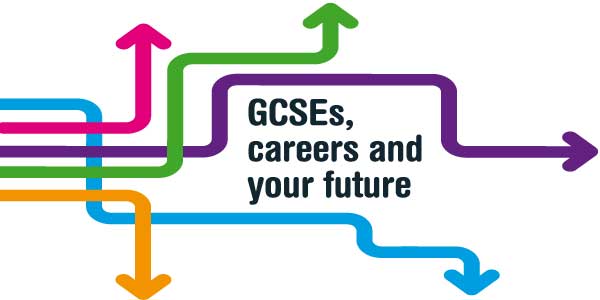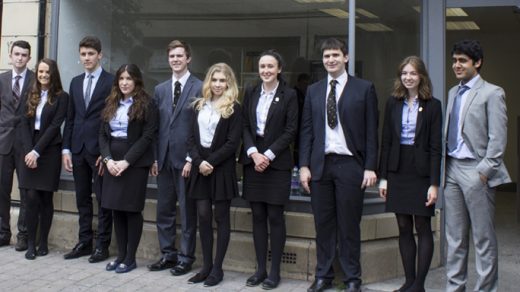GCSEs, careers and your future

In Year 9 pupils are faced with a landmark task – choosing GCSE options. This is the first time pupils get to take control of their education and begin to map out their future aspirations. So just how important are these decisions for their future career? With an increasing selection of options available, how are pupils and parents supposed to make the smart choice? Educate takes a look at the GCSE landscape, what options and careers advice is on offer and whether the subjects you choose really matter.
Words by: Hannah Fowler
GCSEs (General Certificate of Secondary Education) are the main qualifications pupils achieve in Key Stage 4 and are designed to provide a good general preparation for further learning and work. The compulsory core subjects at Key Stage 4 are English, maths and science. Other subjects which are compulsory, but may not lead to exams, include computing, physical education, citizenship, religious studies and sex and relationship education. Schools must also offer a least one subject from each of the following areas: design and technology, arts, humanities and modern foreign languages.
Perhaps the most confusing aspect for students and parents is that schools can set their own compulsory subjects.
A quick look at secondary schools across Merseyside and the difference is vast; compulsory subjects listed in some but not all schools are modern foreign languages, religious studies, information and communications technology (ICT) and PSHEE. Vocational qualifications such as BTEC are also offered at Key Stage 4 in a range of subjects including sport, travel & tourism and creative media.
Even among the compulsory subjects such as science, students can choose to study in different ways. The GCSE science conundrum is one that faces many students as this choice can limit possible pathways in to further education, such as A-levels. Students have the option to study ‘double science’, where pupils obtain two GCSEs across biology, physics and chemistry or ‘triple science’ where students achieve three separate GCSEs across the science subjects.
Although it may not seem like there’s much difference between the two choices – in fact some students will prefer the double award as it opens up the possibility of choosing another GCSE subject – if a student is considering a science-related career, then schools may advise students to take triple science as it keeps their options open. Some science-related courses at universities can specify that an applicant must have achieved certain GCSE qualifications; for competitive subjects like medicine, dentistry or pharmacy this is particularly relevant as many universities will refer to GCSE results when deciding on a student’s application.
Choosing your GCSEs is a pivotal moment; it places a student’s future in their own hands for the first time. However in recent years, governmental changes have reinforced a hierarchy of subjects in secondary schools and narrowed the choices available for students.
The introduction of the English Baccalaureate (EBacc) has arguably placed more importance on the core academic subjects at GCSE level. While first announced in 2010, the EBacc will be compulsory for the majority Year 9 students choosing their options this year, requiring them to take English, maths, a humanity, science and a language.
Just how significant is this? Well, considering these five subjects amount to between six to eight GCSEs, you can see how many argue the EBacc is limiting teenagers GCSE options and pushing out subjects such as art, drama, music, design and technology and religious education. According to official statistics published by exam watchdog Ofqual, the number of GCSE exams being taken in ‘expressive’ subjects such as art, design and drama has fallen since 2015. In the same time period, the number of candidates for science subjects grew by 105,000 and for history and geography by 33,000. While this is encouraging news for science and humanities subjects, should it be at the expense of creative subjects?
If a student shows natural talent in art, has ambitions in the theatre or showcases flair for design, should we be undervaluing these creative subjects? Chris Bayes, collaborative network manager at the Merseyside Network for Collaborative Outreach (MNCO) believes the emphasis on the EBacc has resulted in less flexibility for students when choosing their options. “The development of the EBacc as a standard which maintains that English, maths, science, a language and a humanity define a good education doesn’t really take into account that we all have different learning styles and doesn’t leave much flexibility for creativity,” says Chris. “Especially at a time when the Confederation of British Industry is trumpeting the UK’s status as the home to world-beating creative industries and demanding an education system which produces more creative people.”
MNCO is a collaborative partnership between Higher Education institutions and Further Education Colleges in Greater Merseyside, as such Chris works alongside institutions such as University of Liverpool, Edge Hill University and Hugh Baird College to give information, advice and guidance (IAG) to young people at key transition points during their educational pathway. Perhaps most worryingly, Chris says he has had conversations with parents who regard some subjects as ‘soft options’ and are being wrongly advised that certain subjects would not lead to a university education. “Obviously, there is still scope for pupils to pick up a specialism such as Creative and Performing Arts subjects at a later stage, but I’d argue that many would be less likely to do this if they’re actively discouraged from gaining a grounding in these subjects from an early age,” says Chris.
The government introduced further reforms for GCSE courses starting in 2015 to keep pace with universities’ and employers’ demands. By 2019, all GCSE results will use a new system of grading, intended to help provide more differentiation, especially among higher achieving students. The new approach will bring an end the traditional A*-G and will introduce 9-1 grading, with 5 considered a good pass and grade 9 being the highest and set above the current A*. Regardless of how GCSEs are assessed, the debate on what choices to make and how these effect young people’s careers is ongoing. Traditionally seen as a ‘stepping stone’ to A-levels and then university, the expanding post-16 options for young people, including apprenticeships and vocational courses have arguably placed more importance on GCSEs than ever.
So, should students be worried about dropping a subject and it radically affecting their future? It’s a complex picture, but ultimately it depends on what a teenager wants to do next. If university is on the agenda, then most will expect at least a grade C in English, maths and – sometimes – science. Entry requirements vary from institution to institution but also for different course programmes, so students are advised to check with admissions tutors. Birmingham University regards GCSEs as “very important” while Cambridge has no GCSE requirements for entry to its undergraduate courses, except for medicine and veterinary medicine.
The EBacc, although represents subjects which are highly valued by competitive universities, is not an official requirement, even among Russell Group institutions. Some universities and courses may ask for a grade C or above in a modern foreign language, but if a student missed out on the C grade or didn’t take it all together, it’s unlikely to damage their application.
If needed, a student may be expected to complete a short language course before or during their first year of study.
For apprenticeships, entry requirements vary and you may need up to five GCSEs at grade A* to C including maths and English.
If GCSEs have the greatest influence on anything, it’s a student’s A-levels choices and thus, links GCSEs back to the overall cycle of qualifications leading up to higher education. The entry requirements for school sixth forms and colleges differ, but normally students are required to obtain a minimum of four to five C’s, with many across Merseyside asking for at least B’s in the subjects that students wish to study further. Schools can set their own grade requirements for sixth forms, so if a child wishes to study at a specific college or stay on at school, understanding what’s expected of them at GCSE level is important.
The priority for students should be taking a balanced and broad set of GCSEs and achieving the best possible grades. With so much differentiation from school to school, the importance of in-depth careers guidance and information at this stage is vital to ensure students and parents understand what’s on offer and work together with teachers to make the best possible choices. And here lies the all-important question: are we doing enough to ensure pupils make smart choices?
Over the last few years, there have been a number of changes to the way careers guidance is delivered to young people. Until 2012, the responsibility of this guidance rested with local authorities and was delivered through the youth careers advice service Connexions. A new act was created in its place and stated that all local authority maintained schools in England need to secure access to independent, impartial careers guidance for their pupils in years 8-13. The model of careers guidance provided by the Department of Education is a flexible one and perhaps it should be, as not all students will need the same level of careers guidance at the same time, for example its more prevalent at key transition periods during GCSEs and A-levels. However, with flexibility comes inconsistency, and schools have been criticised for providing information which is too narrow or inadequate.
“There needs to be greater emphasis placed on the importance of information, advice and guidance (IAG) in schools,” says Chris. “This has been recognised by both OFSTED and the Government. Careers guidance in schools has long been criticised as being inadequate and patchy. Ofsted reported in 2013 that: ‘only one in five schools were effective in ensuring that all students were receiving the level of information they needed’”.
The development of national initiatives such as the Careers & Enterprise Company is a step in the right direction says Chris, but more needs to be done to build meaningful, sustained relationships with schools and their local employment market. “There will be some schools which can exhibit excellent practice in this area, but equally there will be others that aren’t doing enough at the moment.
One thing I do feel whenever I meet colleagues from across the Liverpool City Region is a determination and a passion to improve things,” adds Chris.
How do we excite teenagers with the endless career opportunities out there, and motivate them to start thinking about their GCSE options, further education and beyond that, a successful career which they enjoy? Beyond the GCSE options evenings and booklets, schools and students can get involved with many initiatives which can help them on their journey. For teenagers in year 8 and 9 the focus should be on engaging with different subjects to find out what they truly enjoy – even if this means taking an extra-curricular approach to help them get a head start.
One such extra-curricular initiative is The Girl Geek Academy, an eight week course for 11 to 16 year olds in Merseyside. “The Girl Geek Academy was designed for teenagers to gain hands on, after school experience in subjects that aren’t taught yet in schools at this level,” says Chelsea Slater, co-founder of Liverpool Girl Geeks, which is behind the academy. “We want girls to have the opportunities that they are not currently getting and we want to build their self-esteem so that they are confident enough to research careers within the Digital and Technology sectors.”
Launching this month, the academy will focus on skills such as coding, 3D printing and robotics and show students how exciting and revolutionary the opportunities in the tech sector are.
MNCO also works in partnership with the region’s universities and colleges to offer a number of tailored programmes to support schools with careers guidance in pupils in year 8 and 9. The ‘It’s your Choice’ programme delivered by the University of Liverpool’s Widening Participation & Outreach team work with schools across Merseyside to encourage young people to recognise that opportunities in further and higher education are open to them.
Likewise, Liverpool John Moores University has a ‘Dream, Plan, Achieve’ programme for year 9 upwards. “Pupils are encouraged to explore the concept of option choices at GCSE and beyond, encouraging participants to recognise the impact that subject and qualification choices can have on their own futures and the importance of making informed choices,” says Chris.
At 14, not many teenagers will have their careers mapped out, and if they do, it’s likely to change. For students to succeed, they need to be happy, motivated and ultimately enjoy the subjects they have chosen. The GCSE years should be focused on developing new skills, fine-tuning what you like and dislike and eventually narrowing a specialism for higher education or the world of work. After five years of secondary education studying a broad range of subjects, GCSEs evaluate learning and is the student’s chance to show off their hard work and commitment. If a student can do this, then it stands them in good stead for not only passing exams, but a future career too. As Chelsea says, “At this stage you need to be creative, widen your options and enjoy your education.”
Educate’s Top Five Resources
Key Stage 4 Options Booklet
Every school will have a guide to Year 10/11 choices and the majority will host an options evening or some sort of information event inviting year 9 students and parents to talk through GCSE options. This is important as here you will find out what subjects are compulsory, what optional subjects are on offer and important information on how the examinations are assessed.
Merseyside Network for Collaborative Outreach (MNCO)
If you’re a teacher or school looking for new ways to approach GCSE options guidance or find out about upcoming events in the region, a visit to MNCO is a must. The MNCO makes it easier for teachers to access information and help students make informed choices at key transition periods. www.mnco.org.uk
Success at School
This is a fantastic national careers website aimed for students aged 13-19. With advice on GCSE options, career pathways, universities, work experience, apprenticeships and working life, it’s a great platform to help teenagers explore their next steps. www.successatschool.org
The Student Room
Starting conversations with teachers, parents or other students is a great idea as it’s important a child is taking an active role in their GCSE choices. The Student Room is a fantastic student community where students can ask questions, join forums and browse learning resources related to GCSE options and beyond. www.thestudentroom.co.uk
Parental Guidance
If you’re a parent thinking about your child’s future career, then the Parents Guidance website is for you. Packed with up to date information and guides, the website offers clear, concise and impartial guidance to help parents get to grips with the options available. www.parentalguidance.org.uk




